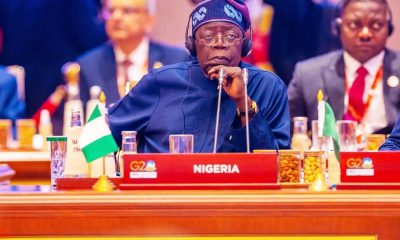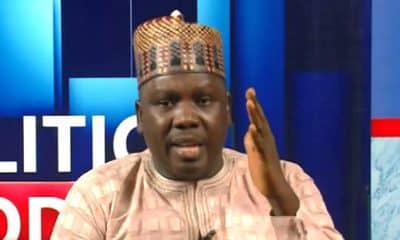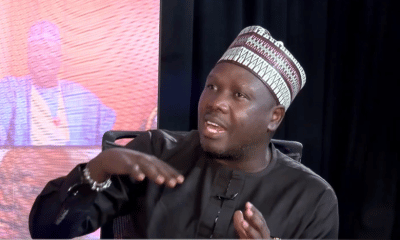Nigeria News
Nigerian Senators Divided Over Return To Regional System Of Government

Nigerian Senators are divided over the proposal to return to a regional system of government, with lawmakers from the Southern and Northern regions expressing conflicting opinions on the matter.
The discussions took place on the sidelines of a two-day retreat focused on constitutional amendments, organized by the Senate Committee on Constitution Review in partnership with the Policy and Legal Advocacy Centre (PLAC) in Kano.
While Southern Senators see the return to regional governance as a potential solution for improving the economy, addressing insecurity, and speeding up infrastructure development, their Northern counterparts oppose the idea.
Senate Leader, Opeyemi Bamidele, clarified that regionalism is not included in the ongoing constitution review process.
Senator Abdul Ningi, representing Bauchi Central, strongly opposed the idea, citing his region’s lack of development during the First Republic when regional governance was in place.
He criticized those advocating for regionalism, questioning their mandate and reminding them that only the National Assembly has the authority to review the constitution.
Ningi insisted that his senatorial district would not support regional governance, and his focus was on improving federalism.
Ningi said, “I have heard so much about regional government or federalism, and I have heard people canvassing for such ideas.
“For a start, no matter how you see it, the current document (1999 Constitution) is still the grundnorm. It has also stipulated how it is going to be amended.
“Having said that, it is also imperative to know that it isn’t just enough for anybody to come and say they are the representative of one ethnic group or another at the National Assembly.
“The question that arises is: when was this mandate canvassed? When was it received? You are a representative of a particular ethnic group in Nigeria, at what time were you given the mandate to canvass that?
“The only people that are given this mandate to look at the Constitution and amend it are, of course, members of the National Assembly.
“Therefore, it is important for those who go about selling these ideas, false ideas in my opinion, that they are representatives of the people, to let Nigerians know where they are coming from, on whose mandate, and when was this mandate given to them.
“We have seen how the regional government was operated in the past. My part of the country that I am representing didn’t enjoy the development of that so-called regional government that was based in Kaduna.
“We aren’t going back there again! I am speaking for my senatorial district. It is either the Nigerian Federation or nothing. We can’t go along; my senatorial district will be satisfied independently with Nigeria, if that is what is required.
“As far as regional government is concerned, my constituency, my people aren’t for it. What we need is reform of the current Federal Government structure and fiscal federalism because there is nothing like true federalism.”
Chairman of the Senate Committee on Finance, Senator Sani Musa, also warned against confusing the establishment of zonal development commissions with a move towards regionalism.
He explained that these commissions aim solely to boost the economic development of their regions, not to reintroduce regional governance.
Musa encouraged proponents of regionalism to introduce bills in the National Assembly and test the popularity of their ideas.
He said, “It is wrong for anybody to think that the development commissions being established for the six geopolitical zones are a plan towards regionalism. It is not.
“Those who are advocating for it should come up with bills through their representatives in the National Assembly and test the popularity of their proposal.”
Former Senate Leader, Ali Ndume, dismissed the idea of true federalism, stating that many African countries had moved beyond that system.
Instead, Ndume advocated for the creation of strong institutions to ensure good governance and tackle issues like corruption and insecurity.
He argued that if proper governance systems were in place, the call for regionalism would diminish as justice, fairness, and equity would prevail across all regions.
Senator Muntari Dandutse, representing Katsina South, echoed this sentiment, urging Nigerians to focus on improving governance rather than pursuing regionalism.
He emphasized that all parts of the country are endowed with resources and that proper management of these assets is key to progress.
Dandutse said, “We should not have myopic thinking about ourselves. There is no section of this country that is not blessed.
“What is important is that we should have good governance and credible and responsible access to the resources that we have because Nigeria is blessed.
“We have all the comparative advantages that will move this country forward unless, of course, we are serious and determined.”
In contrast, Senator Abdulfatai Buhari, representing Oyo North, supported the idea of regional governance, pointing to the First Republic’s success in allowing regions to harness their resources effectively.
Buhari argued that decentralizing power from the center would reduce corruption and encourage accountability at local levels.
Buhari also hinted that the South West had specific proposals for the ongoing constitutional review, though he refrained from disclosing details, promising that they would be revealed when the time was right.
Buhari said, “Recall that the regions were able to harness their resources in the First Republic.
“We were able to harness all our resources. There was no dominance of particular resources.
“In those years, the North was known for the groundnut pyramids, the South West for cocoa. We should be able to do that.
“When you make the center less attractive, you cut off corruption. You can’t wipe it off, but you can cut it down, because there is what is called ‘watch your team.’ People will watch their team within their locality or within their region.”
Despite these differing views, Senate Leader Bamidele stressed that regionalism cannot be reintroduced through simple constitutional amendments.
He pointed out that any such significant change would require broad political consensus and the approval of the Nigerian people.
Bamidele explained the complexity of amending the constitution, noting that even minor changes require extensive legislative procedures, making it unrealistic to completely overhaul the constitution through the current process.
He said, “There are some decisions in the state where an executive bill cannot come to the parliament unless there is some political consensus.
“For me, going back to a regional form of governance is something that will go beyond a bill being sponsored, either as a member’s bill or as an executive bill.
“It’s also not something that you sit down in a public hearing room and organize a public hearing to take a decision on.
“An example is when people say, ‘Oh, you are in parliament. As a parliament, you cannot discard the entire constitution. Nigeria needs a new constitution because this one cannot work.’
“It’s easy for people to make such arguments, but that is not something we can sit down in parliament and do.
“We aren’t changing the constitution because that would require political consensus, and it would also require the buy-in of the Nigerian people themselves.
“Why is it so difficult to amend even one section of the constitution, let alone discard the entire constitution?
“To amend a single provision in the constitution today, the National Assembly and all chambers have to go through this entire process, which we go through in every legislative assembly, and many of you have been a part of this process.”












